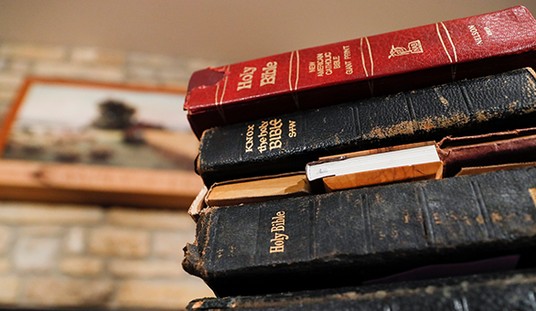A pleasant surprise from the Supreme Court, which upheld the right of Greece, New York, to open their town meetings with a prayer.
The court split along liberal/conservative lines with sometimes swing vote Justice Kennedy delivering the majority opinion.
From the Wall Street Journal:
“Our tradition assumes that adult citizens, firm in their own beliefs, can tolerate and perhaps appreciate a ceremonial prayer delivered by a person of a different faith,” Justice Kennedy wrote.
Shorter Kennedy: Grow up, America.
How refreshing that a justice of the Supreme Court actually wants to treat American citizens as adults. Of course, those who want to keep religion at arms length or even eliminate it will throw a tantrum over this decision — just like any normal, healthy two year old would.
I don’t know how far this decision will stretch, given some significant and special circumstances:
The Supreme Court’s majority held that the practice fell within acceptable American traditions that are compatible with the Constitution. “The town of Greece does not violate the First Amendment by opening its meetings with prayer that comports with our tradition and does not coerce participation by nonadherents,” Justice Kennedy wrote.
The court said the fact nearly all the clergy who delivered invocations were Christian reflected no bias. Instead, it noted the predominance of Christian prayer reflected the community, where no congregations of other faiths were listed in the town directory. And while some invocations used highly sectarian imagery, such as “the saving sacrifice of Jesus Christ on the cross,” many of the prayers were invoked more universal themes, the court said.
In dissent, Justice Elena Kagan wrote, while the Constitution doesn’t impose “a bright separationist line” between church and state, Greece’s policy still violated the First Amendment’s establishment clause because it produced overwhelmingly sectarian prayers at government meetings.
“Month in and month out for over a decade, prayers steeped in only one faith, addressed toward members of the public, commenced meetings to discuss local affairs and distribute government benefits,” Justice Kagan wrote, in a dissent joined by Justices Ruth Bader Ginsburg, Stephen Breyer and Sonia Sotomayor. “The practice thus divides the citizenry, creating one class that share’s the board’s own evident religious beliefs and another (far smaller) class that does not.”
The American Civil Liberties Union, which filed a brief supporting the challengers, said it was disappointed with the ruling. “Official religious favoritism should be off-limits under the Constitution,” said Daniel Mach, director of the ACLU’s freedom of religion and belief program.
The Supreme Court previously upheld the practice of prayer before state legislatures, noting that, since the 18th century, the U.S. Congress has employed a chaplain to summon God’s blessing for its own proceedings. Justice Kennedy wrote that, despite differences between Greece’s policy and the function of the town board, the 1983 precedent involving the Nebraska legislature’s practices applied equally to Greece.
The idea that a prayer said before a meeting of the town council is somehow an effort to establish a particular religion is transcendentally bizarre. While we’re on the subject, the same goes for placing a creche on the village green, or holding an Easter egg hunt on public property. Should these traditions be nixed just because childish, intolerant bullies can convince 5 berobed mandarins that up is down, black is white, and the Christian bogey man wants to convert you by placing a manger in a city park?
As the majority agreed, there is value in tradition and some traditions are so precious that any question of their constitutionality should be answered, if at all possible, in the affirmative. I don’t think this decision will translate well everywhere. Certainly, in other towns where there is a more diverse religious base, other faiths should be — and probably would be — represented in offering the prayer.
But as a statement reaffirming a basic right to worship, the decision succeeds in maintaining both freedom of religion as well as the right to keep our traditions intact.










Join the conversation as a VIP Member